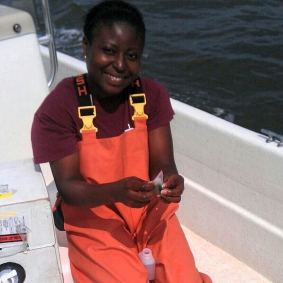Knauss legislative fellowships in Congress help build careers — and they're fun and educational. See our video and fact sheet for details.
Efeturi Oghenekaro

Fellowship Institution:
NOAA, Office of Oceanic and Atmospheric Research, Office of International AffairsStart Year:
2016Efeturi Oghenekaro will be working in the NOAA Research Office of International Affairs. She will contribute to NOAA’s research in the Arctic and support NOAA’s efforts with the Transatlantic Ocean Research Alliance, a cooperative effort between the United States, Canada, and the European Union.
Oghenekaro completed her undergraduate degree in fisheries science at the University of Benin, in Nigeria. She earned her doctoral degree from University of Maryland Eastern Shore in marine, estuarine, and environmental sciences. Her doctoral research documented spatial and seasonal patterns of abundance in mesozooplankton. She also documented five species of marine cladocerans, which are small crustaceans.
Oghenekaro, who is enthusiastic about international affairs, hopes that this fellowship will introduce her to the process of planning and implementing international collaborative research in ocean science. She also enjoys participating in outreach activities, where she can help educate people on environmental science, conservation, and sustainability.
Call for Symposium Presenters and Authors
The Chesapeake Rising: Innovative Law and Policy Solutions for Climate Adaptation in Coastal Communities symposium will explore key legal and policy considerations that affect climate adaptation strategies. It provides a unique opportunity for upper-level law students and early-career lawyers to present and publish their legal scholarship.
Program Announcements
-
-
Maryland Sea Grant has program development funds for start-up efforts, graduate student research, or strategic support for emerging areas of research. Apply here.
News and Blogs
Video Gallery
Sea Grant Film Explores a Diminishing Smithville
Smithville is a community on Maryland’s Eastern Shore, on the edge of the Blackwater National Wildlife Refuge. A century ago, Smithville had more than 100 residents. Today, it has four, in two homes: an elderly couple, and one elderly woman and her son, who cares for her.
Featured Fellow
Featured Research Project
Developing a habitat model for mysids, an important link in Chesapeake Bay food webs
Mysids are important mesozooplankton prey for many species of fish in Chesapeake Bay and are an important link in transferring energy from lower to upper trophic levels. Mysids also serve as biological vectors for benthic-pelagic coupling due to their diel vertical migration and omnivorous prey-switching behavior, which makes mysids important regulators of food web architecture. Despite their central role in coastal food webs, surprisingly little is known about mysid ecology and dynamics in Chesapeake Bay.
The Blue Crab: Callinectes Sapidus
An essential resource for researchers, students, and managers. Get your copy today!


©2025 Maryland Sea Grant. All rights reserved.
5825 University Research Court, Suite 1350 | College Park, MD 20740
Phone: (301) 405-7500 | Fax: (301) 314-5780 | Contact Us



